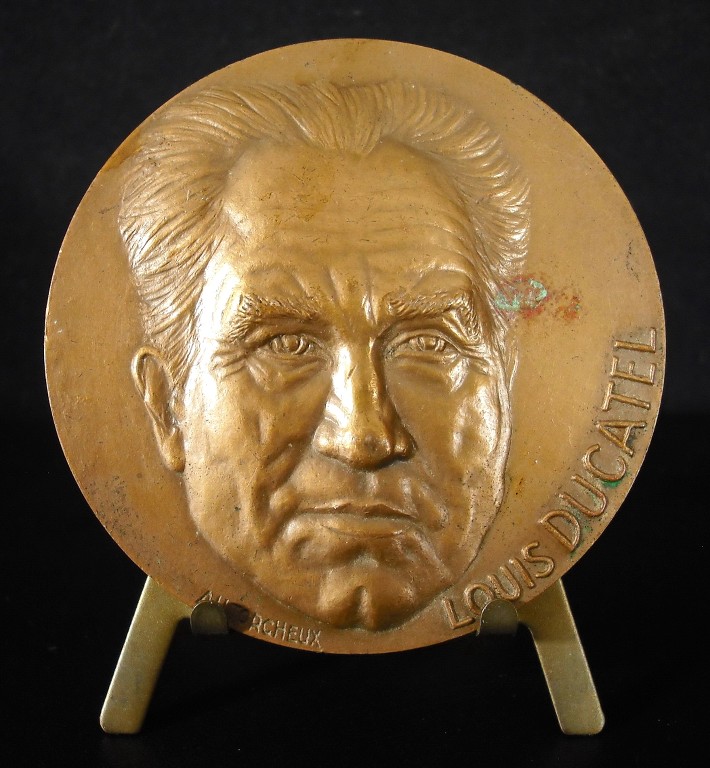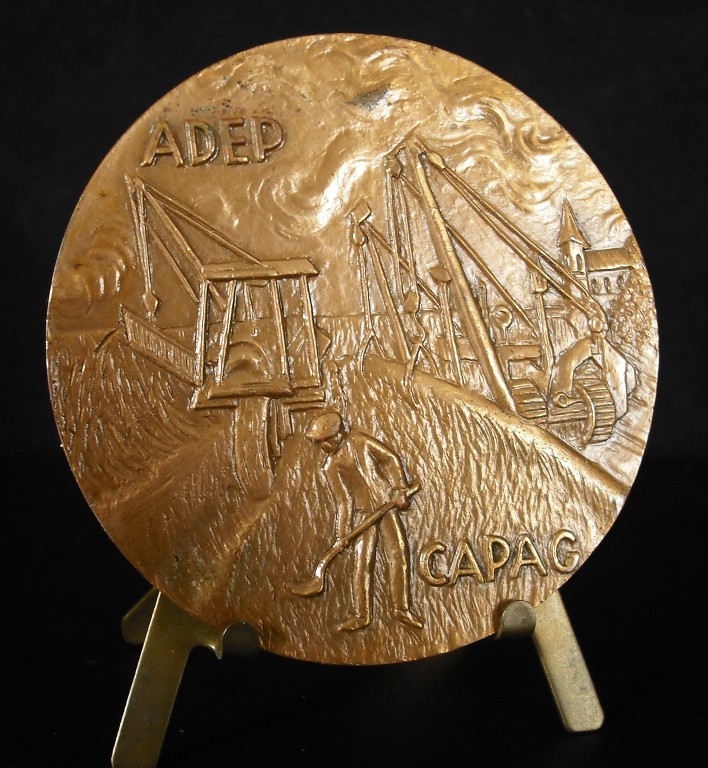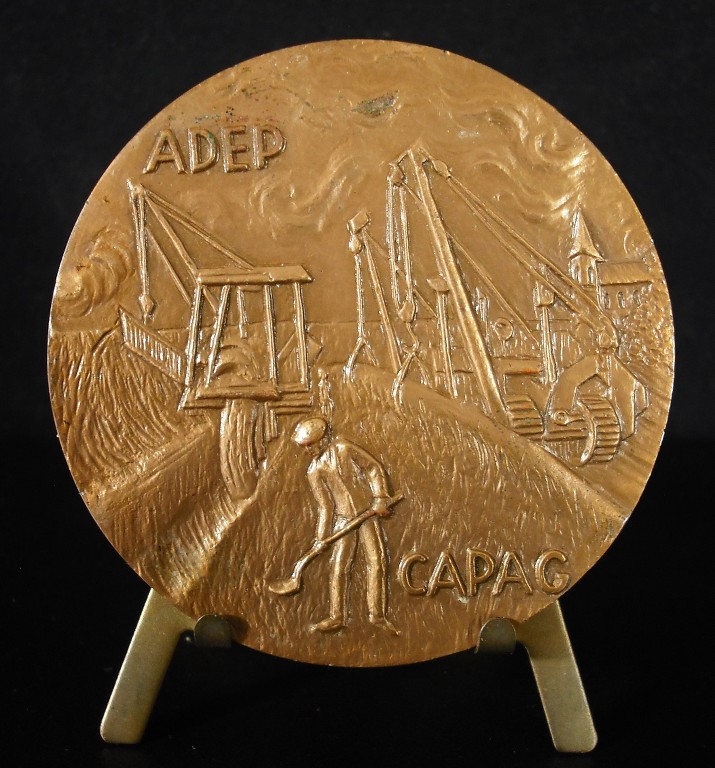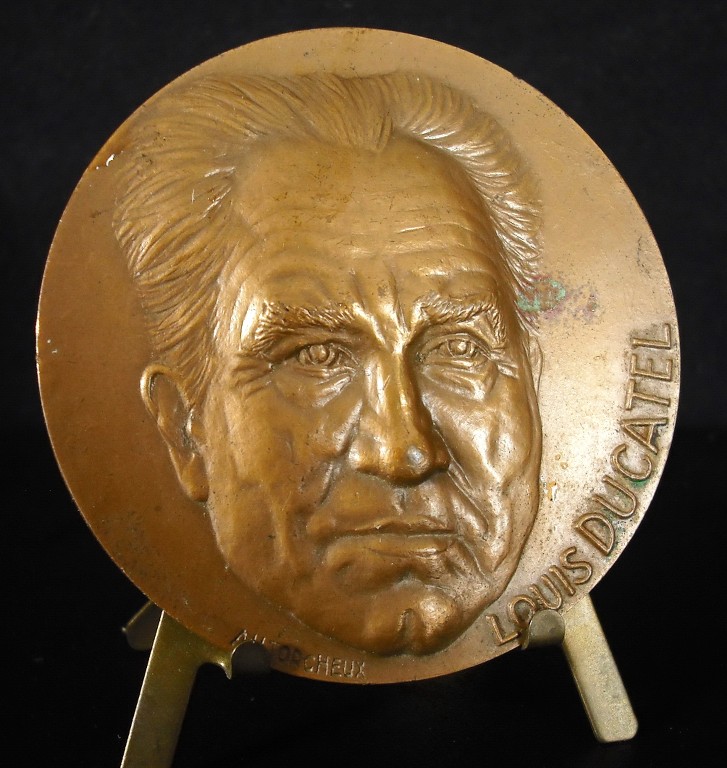Small patina defects.
Engraver / Artist : André TORCHEUX (1912-?).
Dimensions : 68mm.
Weight : 185 g.
Metal : bronze.
Hallmark on the edge (mark on the edge) : cornucopia + bronze + 1960.
Quick and neat delivery.
The stand is not for sale
The support is not for sale.
Louis Ducatel, born Mars 13, 1902 in Frévent (Pas-de-Calais) and died June 28, 1999 in Mougins (Alpes-Maritimes), is a French engineer, entrepreneur and politician.
He is mainly known today for having been a candidate for the presidency of the Republic in 1969, as a various left-wing candidate. He obtained 1.27% of the votes in the first round.
Biography
Born to a shoemaker father and a mother who, according to him, “worked in the salt mines at the age of 11”1, he studied engineering1.
Successful entrepreneur
He will become a successful entrepreneur in public works, mechanical and electrical construction, managing around ten companies in Paris, employing a total of more than 2000 employees2;1.
He set up on his own in 19281 and in 1938 created CAPAG, a pipeline company3. He would later be the inventor of the “Ducatel pipe”, an “unbreakable” pipe but which, due to lack of profitability, would put his fortune in jeopardy for a time2. After the war, he launched into construction3, participating among other things in the construction of the Paris ring road at Porte d'Auteuil2. In 1967, he created the Association for the Defense of Private Enterprise1, of which he then became honorary president2.
Political career
He joined the Radical Party2 in 19271, became a member of its executive committee then in 1936, secretary of the deputy for the North Alfred Lacourt1. He ran, unsuccessfully, in the legislative elections that same year1.
At the Liberation, he was found on a Resistance electoral list. In 1953, he joined the Rally of Republican Lefts (RGR) then led by Bernard Lafay then the Republican Center of André Morice of which he became vice-president2.
He was elected to the Municipal Council of Paris2 from 1948 to 19651 and was its vice-president from 1961 to 19621. He was elected in 1945 to the General Council of the Seine1.
Michaël Gérard in an article on free candidacies for the presidential elections mentions the interest sought by Ducatel in these political commitments1: He thus committed himself to the Radical Party after a meeting on a train with an activist of this party who explained to him the advantages that he could benefit from it as an industrialist and when he was on the municipal council of Paris, he tried to obtain the award of contracts for his companies1.
Presidential candidacy
Then aged 67, he presented himself without a label - but defining himself as in the center -4 in the French presidential election of 1969 obtaining 150 sponsorships from local elected officials2 out of the 100 required. His program was mainly focused on freedom of enterprise and a reduction in taxation2. He proposed a tax exemption for all employees earning less than 1000 francs per month2, to increase the minimum wage from 10 to 20%4, and a massive reduction in state spending4. He advocated popular capitalism and the “United States of Europe”2. In his campaign interventions, he constantly denounced "the excesses of technocracy, administration and taxation"3 and presented himself as the "candidate of average French people"5 (even if he was then wealthy, at his death Le Monde in its obituary presented him as a “billionaire”4 (in francs).
Credited with 1% of votes in different
He is mainly known today for having been a candidate for the presidency of the Republic in 1969, as a various left-wing candidate. He obtained 1.27% of the votes in the first round.
Biography
Born to a shoemaker father and a mother who, according to him, “worked in the salt mines at the age of 11”1, he studied engineering1.
Successful entrepreneur
He will become a successful entrepreneur in public works, mechanical and electrical construction, managing around ten companies in Paris, employing a total of more than 2000 employees2;1.
He set up on his own in 19281 and in 1938 created CAPAG, a pipeline company3. He would later be the inventor of the “Ducatel pipe”, an “unbreakable” pipe but which, due to lack of profitability, would put his fortune in jeopardy for a time2. After the war, he launched into construction3, participating among other things in the construction of the Paris ring road at Porte d'Auteuil2. In 1967, he created the Association for the Defense of Private Enterprise1, of which he then became honorary president2.
Political career
He joined the Radical Party2 in 19271, became a member of its executive committee then in 1936, secretary of the deputy for the North Alfred Lacourt1. He ran, unsuccessfully, in the legislative elections that same year1.
At the Liberation, he was found on a Resistance electoral list. In 1953, he joined the Rally of Republican Lefts (RGR) then led by Bernard Lafay then the Republican Center of André Morice of which he became vice-president2.
He was elected to the Municipal Council of Paris2 from 1948 to 19651 and was its vice-president from 1961 to 19621. He was elected in 1945 to the General Council of the Seine1.
Michaël Gérard in an article on free candidacies for the presidential elections mentions the interest sought by Ducatel in these political commitments1: He thus committed himself to the Radical Party after a meeting on a train with an activist of this party who explained to him the advantages that he could benefit from it as an industrialist and when he was on the municipal council of Paris, he tried to obtain the award of contracts for his companies1.
Presidential candidacy
Then aged 67, he presented himself without a label - but defining himself as in the center -4 in the French presidential election of 1969 obtaining 150 sponsorships from local elected officials2 out of the 100 required. His program was mainly focused on freedom of enterprise and a reduction in taxation2. He proposed a tax exemption for all employees earning less than 1000 francs per month2, to increase the minimum wage from 10 to 20%4, and a massive reduction in state spending4. He advocated popular capitalism and the “United States of Europe”2. In his campaign interventions, he constantly denounced "the excesses of technocracy, administration and taxation"3 and presented himself as the "candidate of average French people"5 (even if he was then wealthy, at his death Le Monde in its obituary presented him as a “billionaire”4 (in francs).
Credited with 1% of votes in different



